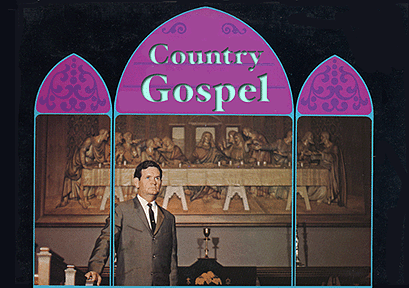Holiday Music | Other Country Styles
![]() Connie Abner "Heaven Is My Destiny" (1973) (LP)
Connie Abner "Heaven Is My Destiny" (1973) (LP)
A singer from Detroit, Michigan, Connie Abner self-funded her first record, Heaven Is My Destiny, then rolled the money she got back from sales into cutting a second LP on Melody Records, a label located in Hamilton, Ohio. This record was mentioned in the liner notes of the second one -- other than that, I don't have much information about this disc, or about Ms. Abner.
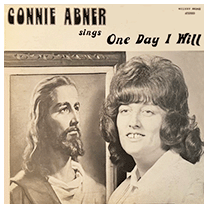 Connie Abner "...Sings One Day I Will" (Melody Records, 1974) (LP)
Connie Abner "...Sings One Day I Will" (Melody Records, 1974) (LP)
(Produced by William M. Jones)
Though the Melody label was located in Hamilton, Ohio, Ms. Abner herself was from Detroit, Michigan, and apparently traveled to William Jone's studio to cut this second album of gospel material. Presumably the band was provided by the label: certainly some of the musicians were familiar names from other private-press southern gospel records, notably steel player Ricky Todd, a Cincinnati-area musician who did a bit of session work in his youth. Also on this album are Gary Duffy (flattop guitar), Mike Harris (drums), Danny Meade (bass), and Tim Woodward on piano... I'm not sure if Connie Abner made any other full albums, though she did also record a few singles.
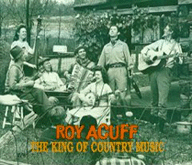 Roy Acuff "The King Of Country Music" (Bear Family Records, 1993)
Roy Acuff "The King Of Country Music" (Bear Family Records, 1993)
This 2-CD set is actually made up of Acuff's 1950s recordings, made for the Capitol and Decca labels, and includes re-recorded versions of many of his classic songs, first recorded on Columbia in the 1930s and '40s. It's nice, though the studio sound at the time was much smoother and less bluesy than on the originals. Although he was one of the most powerful men in Nashville at the time, Acuff was still a bit of a throwback, with sparse arrangements and a plain, simple delivery that was in sharp contrast to the increasingly lavish production and poppish crooning of the day. Personally, I find his old stuff more exciting, but this is still a nice set, and has Bear Family's hallmark great sound quality and well-researched liner notes. Lotsa gospel material mixed in with the secular stuff.
Roy Acuff "Favorite Hymns" (MGM Records, 1958) (LP)
Roy Acuff "That Glorybound Train" (Columbia Harmony, 1961) (LP)
Roy Acuff "Hand Clapping Gospel Songs" (Hickory Records, 1964) (LP)
Roy Acuff "Sacred Songs" (MGM/Metro Records, 1965) (LP)
This appears to be a repackaging of the MGM album listed above.
Roy Acuff "Waiting For My Call To Glory" (Columbia Harmony, 1966) (LP)
Roy Acuff "Roy Acuff" (Hilltop Records, 1970) (LP)
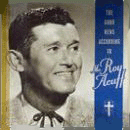 Roy Acuff "The Good News According To Mr. Roy Acuff" (Audium Records, 2001)
Roy Acuff "The Good News According To Mr. Roy Acuff" (Audium Records, 2001)
A collection of gospel material recorded during Acuff's stint on his own Hickory Records label, recorded during the 1960s and '70s.
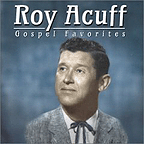 Roy Acuff "Gospel Favorites" (Music Mill, 2004)
Roy Acuff "Gospel Favorites" (Music Mill, 2004)
Religious material; this disc is generously packed with twenty tracks, although I'm not sure what vintage they are (haven't seen the album myself, and often these cheapie reissues don't have the greatest liner notes anyway...)
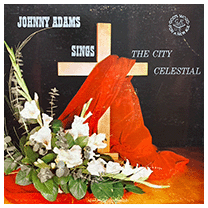 Johnny Adams "...Sings The City Celestial" (Gospel Record Service, 1966-?) (LP)
Johnny Adams "...Sings The City Celestial" (Gospel Record Service, 1966-?) (LP)
(Produced by Rev. Ray Anderson)
Primitive country gospel, not so much in the musical backing, but in Mr. Adams's unrelentingly rough, stylistically limited vocals, which I find appealing, though best in small doses. Mr. Adams hailed from Washington Court House, Ohio, and is backed here by his son Joe Adams, son-in-law Roger Snively, and a friend named James Bick -- unfortunately, he does not inform us about who played which instruments, though there is a solidly rural, backwoods feel throughout. This album is very much in keeping with the primitive style of producer Ray Anderson, a fellow Ohioan who had set up shop in Parkersberg, West Virginia at the time this album came out... The liner notes inform us this was Johnny Adams's first album, though I cannot tell you if he made another. Not a dazzling record, but authentic, and direct.
 Larry Adams "The Sun's Coming Up" (Echo Sound, 19--?) (LP)
Larry Adams "The Sun's Coming Up" (Echo Sound, 19--?) (LP)
A member of the Church Of God in Gilbertown, Alabama, twenty-eight year old Larry Adams contracted polio at age nine, and started playing the harmonica as a way to strengthen his lungs. He was drawn to pentecostalism and used this album as an expression of his faith. This appears to have been his only record, with backing from Randy Allred (bass), John Noski (rhythm guitar), Andrew Shelnut (drums), Randy Shelnut (lead guitar and steel) and Derrell Stewart (piano) in a fairly slick set of country gospel vocals. Not sure when this came out, but t looks like a late- 'Seventies outing, maybe even early '80s.
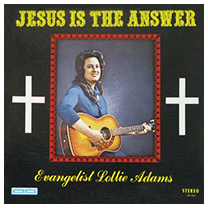 Lollie Adams "Jesus Is The Answer" (19--?) (LP)
Lollie Adams "Jesus Is The Answer" (19--?) (LP)
Not a lot of info on this evangelical singer... She seems to have been Mrs. Lollie Ann Toliver Adams (1953-2016) the wife of Rev. Donald Frank Adams (1951-2013) a Baptist preacher in Hearne, Texas. This appears to have been her only album, and as there's no mention of music in what I think is her obituary, I don't think her musical ministry was that big a part of her life. As always, any information is welcome.
Hobo Jack Adkins "I'll Take The Lord" (Adco Records, 196--?) (LP)
Dennis Agajanian/The Agajanians -- see artist profile
Larry Ahlborn "Heavenly Heartbeat" (Lovenotes Records, 19--?) (LP)
(Produced by Henry Slaughter & Fred Cameron)
An all-gospel set, recorded in Nashville with steel player Larry Sasser, and Henry Slaughter on keyboards...
Alabama "Songs Of Inspiration" (RCA, 2006)
Alabama "Songs Of Inspiration II" (RCA, 2007)
The Alabama Sacred Harp Singers "Sacred Harp Singing" (Rounder Records, 1998)
The Alabama Sacred Harp Singers "Harp Of A Thousand Strings: All-Day Singing From The Sacred Harp (Southern Journey, v.9)" (Rounder Records, 1998)
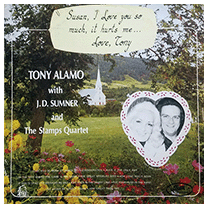 Tony Alamo "Susan, I Love You So Much, It Hurts Me... Love, Tony" (Alamo Records, 197-?).(LP)
Tony Alamo "Susan, I Love You So Much, It Hurts Me... Love, Tony" (Alamo Records, 197-?).(LP)
(Produced by Susan Alamo & Don Davis)
Here's a weird one... At least, one with a weird history. Tony and Susan Alamo were Pentecostal evangelicals whose born-again ministry devolved over the years into a full-blown cult, part of which involved polygamy, and more disturbingly, Mr. Alamo "marrying" underage girls and imprisoning them on a compound in Arkansas. Starting out in Los Angeles as "Jesus freaks" in the late 'Sixties, the Alamos were only moderately weird up until Mrs. Alamo died in 1982, and then Mr. Alamo really went off the rails and his behavior became more extreme and more grotesque. He was eventually arrested in the early 1990s and convicted for tax evasion and child molestation, later dying in federal prison in 2017. This was, I think, the first full album, with Tony Alamo backed by one of the most venerable southern gospel groups, J. D. Sumner & The Stamps. This is almost entirely a gospel album, although the "title track" is a cover of the Floyd Tillman oldie, "I Love You So Much It Hurts Me," a secular love ballad that dates back to the late 1940s. No date on this disc, though Alamo also covers Gene McClellan's pop-gospel crossover hit, "Put Your Hand In The Hand" (first recorded by Anne Murray in 1970, but best known as a top ten 1971 single for the band Ocean) which at least puts us in the right decade. This was probably recorded not long after they set up their Los Angeles-based church in 1969, though it appears to have been recorded in Nashville, as were their other albums.
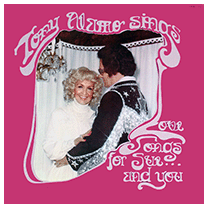 Tony Alamo "...Sings Love Songs For Sue... And You" (Alamo Records, 197-?).(LP)
Tony Alamo "...Sings Love Songs For Sue... And You" (Alamo Records, 197-?).(LP)
(Produced by Porter Wagoner, Tom Pick & Roy Shockley)
Weird album title and a definitely weird, Jim Jones-ish vibe to the album photos, especially his big, black aviator-frame shades. Knowing now what we didn't then... Ew. He's backed here by a Nashville crew that included with Dave Kirby (guitar), Alford Newell (guitar), Mike Leech (bass), Bobby Dyson (bass), Stu Basore (steel guitar), Hargus Robbins (keyboards), James Isbell (drums), Benny Kennerson (keyboards), Mike Lawler (keyboards), Terry McMillan (drums and harmonica), and backing vocals from the Sound 70s Singers... And, of course, the patronage of hick music legend Porter Wagoner, who seems to have fallen under Alamo's spell sometime int he 'Seventies.
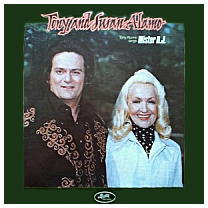 Tony & Susan Alamo "Mister DJ" (Alamo Records, 1977).(LP)
Tony & Susan Alamo "Mister DJ" (Alamo Records, 1977).(LP)
(Produced by Dan Hoffman)
Despite this checkered history, this late-'70s album is actually fairly good in musical terms. The cover art shows them onstage with Porter Wagoner at the Opry, and that got my attention. Wagoner wrote a testimonial for them in the liner notes, and if Porter liked 'em and even sang on their record, I figured I oughta at least check them out. The album is all Christian music, and the title track, "Mister DJ," is about a guy who wants the local radio station to spin "The Old Rugged Cross." Other tracks may have been recorded earlier in non-country versions -- anyone know for sure? Anyway, it's all Jesus-y but there's decent twang in there, too. Super-gross backstory, but I guess it's up to you how or if those later events should color your perception of this old album.
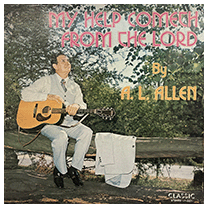 A. L. Allen "My Help Cometh From The Lord" (Classic Records, 1977) (LP)
A. L. Allen "My Help Cometh From The Lord" (Classic Records, 1977) (LP)
(Produced by David Fauss & Kevin McManus)
Wow. This one's definitely a doozy! I mean, for anyone looking for Christian artists playing real-deal country, this disc is hard to beat. Archie Lee Allen (1927-2021) was a Pentecostal preacher living in Vidor, Texas at the time he cut this album, leading a congregation at the Calvary Tabernacle in nearby Beaumont. He was born in Mississippi and had real country roots, playing steel guitar in a hillbilly band with his brothers called the Mississippi Ramblers, but when he turned eighteen in 1945, he got religion and moved away from secular music to become a tent revivalist, working in a wide regional swath that included stints in Indiana, Illinois, Kentucky, Louisiana and elsewhere. He led several congregations before taking the job in Beaumont sometime around 1969, and his music certainly embodied the often wild, expressive tradition of Pentecostal country music. For this record, he the pilgrimage to Nashville to book a studio session with some top-level pickers, and he certainly made the most of it. Though blessed with modest vocal power, he really threw himself into it, backed by guys like guitarist Jack Eubanks, steel player Larry Sasser, and Bruce Watkins, who anchors the session on lead guitar, fiddle and banjo. A lot of times when gospel artists record in Nashville, everybody seems to go out of their way to tone things down -- a little steel guitar softly chiming in the background, but nothing loud enough to scare the neighbors. Mr. Allen, on the other hand, gets these Tennessee boys to really blast away: the opening track, "My Help Cometh From The Lord," is almost shocking in its brash, pure honkytonk vibe, while the lyrics are a real hoot, reveling in the doom and destruction awaiting the unsaved sinners. Though there are a couple of nods to the southern gospel elite -- one song each from Rusty Goodman and Dottie Rambo -- most of the songs are A. L. Allen originals, and they reflect his own bedrock fundamentalism. The energy flags a bit after the dynamic opening number, but not much. This a truly twangy record, and Mr. Allen's willingness to shoehorn clunky religious harangues into the robust arrangements makes for some quality country kitsch. I think he had some later records as well, but details are vague.
A. L. Allen "Sing Unto The Lord" (Classic Records, 1979) (LP)
Rex Allen "The Faith Of A Man" (Mercury Records, 1962) (LP)
Rex Allen "The Touch Of God's Hands" (Decca Records, 1970) (LP)
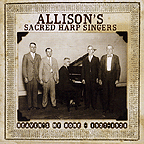 Allison's Sacred Harp Singers "Heaven's My Home: 1927-1928" (County Records, 2004)
Allison's Sacred Harp Singers "Heaven's My Home: 1927-1928" (County Records, 2004)
A fascinating collection of extraordinarily rare old 78s made at the dawn of the country music industry. The religious tradition that the Allison's Singers were from is pretty far afield from the readily commercialized scene that other rural artists pursued, but as with many shape-note performers, the rawness and emotional immediacy of their work is quite striking. It's also such a distinctive sound! This is an American-born musical tradition that is truly like no other, and the County label has done a commendable job rescuing these old discs from the brink of obscurity. This stuff isn't for everyone, but folks who do like it will be thrilled to hear these songs. (Also check out the companion collection, RELIGION IS A FORTUNE, reviewed below...)
 The Amerson Brothers "Thank You For Jesus" (Mission Records, 19--?) (LP)
The Amerson Brothers "Thank You For Jesus" (Mission Records, 19--?) (LP)
(Produced by Jack Logan & Louie B. Swift)
A country-gospel family band from Butler, Pennsylvania, the Amersons included Dan Amerson on steel guitar, Stephen Amerson (drums), Tim Amerson (lead guitar), Tom Amerson (rhythm guitar), with Tim and Tom (who I'm guessing were twins) as the lead singers. This album features liner notes by their father and seems to have been their first record, with additional backing by studio pro Benny Kennerson on piano, and at least one more kid playing bass, possibly Dan Vernon, who played on their later album below... The repertoire is freckled with southern gospel covers from Mylon LeFevre, Ronnie Hinson, a couple of songs from Dwayne Friend, and one by Charles Wycuff of the Happy Goodman band, as well as a trio of originals written by some of the brothers. On this album the lads aren't listed by name, nor are their ages given, but thy all look pretty young, mostly like high school kids, and possibly a couple could have been college age
The Amerson Brothers "Country Gospel" (1974) (LP)
(Produced by Tim Amerson & Gene Lawson)
This album was clearly recorded a few years later -- the lads are older, a few have beards, and although it's clearly a Christian album, clearly the hippie scene had made it to Pennsylvania by '74. The songs draw on more remote corners of the southern gospel scene, including a tune by fellow Pennsylvanian Neil Enloe and "Hallelujah Square," a popular hit by former singing cowboy Ray Overholt. The original Amerson lineup remains the same: Dan Amerson (steel guitar), Stephen Amerson (drums), Tim Amerson (lead guitar) and Tom Amerson playing rhythm guitar, along with Dan Vernon on bass and Bruce Watkins playing banjo, dobro, fiddle and piano, and additional harmonies by a guy from the Hemphills family band.
The Amerson Brothers "The Amerson Brothers" (1979) (LP)
(Produced by The Amerson Brothers)
A later album featuring all five siblings and bass player Dan Vernon, though apparently no more studio ringers this time around... A bunch of covers -- a couple by Rusty Goodman, one by Dallas Holm, etc., though there's only one original from the band, Tom Amerson's "Papa." At least a couple of the brothers kept up their musical careers: Steve made at least one solo album (below), while Tim Amerson formed another group called Tim & Keith, and also played secular country music in a group called The Silver Lake Band (though I don't know if they ever made any records...)
Steve Amerson "Shine On Me" (Light Records, 1986) (LP)
(Produced by Paul Stilwell)
Bill Anderson & Jan Howard "Singing His Praise" (Decca Records, 1972) (LP)
The Anderson Family "Presenting The Anderson Family" (Layman Records, 1977) (LP)
A family band from New Carlisle, Ohio, singing an ideal set of heartfelt country gospel, with covers of classics by Albert E. Brumley, Charlie Louvin, bluegrasser Don McHan, one from McHan's former bosses, Jim & Jesse McReynolds, a cover of Tom T. Hall's "Me And Jesus," and some other more obscure country gems. The group included Betty Anderson (tenor vocals and guitar), her husband Conrad Anderson (lead singer, banjo and guitar), Timmy Anderson (mandolin), Terry Anderson (bass) and additional guitar picking by John Burke. I'm not sure, but Timmy and Tommy look like they might have been twins... Anyway, the Andersons hit all the right notes as far as I'm concerned!
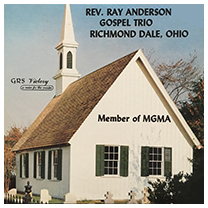 Reverend Ray Anderson "Rev. Ray Anderson Gospel Trio - Richmond Dale, Ohio" (Gospel Recording Service, 19--?) (LP)
Reverend Ray Anderson "Rev. Ray Anderson Gospel Trio - Richmond Dale, Ohio" (Gospel Recording Service, 19--?) (LP)
(Produced by Ray Anderson)
Fans of the Louvin Brothers should love this. A veteran hillbilly singer whose career stretched back to the 1940s, Ray Anderson (1924-2010) started out as a secular artist, cutting singles for Starday and other labels. He was born in West Virginia, and worked on the WWVA Jamboree, though later in life he settled down in Ohio. Anderson's topical novelty numbers, "Sputniks And Mutniks" and "Stalin Kicked The Bucket" are both often-anthologized Cold War classics, showcasing Anderson's style of lively, uptempo rockabilly-adjacent twang. He also played bluegrass, and was bass player for the Osborne Brothers band in a late 'Fifties lineup that also included Red Allen. At some point, Anderson got religion and became an ordained minister in the early 1960s, leading his own church in Richmond Dale, Ohio while starting the Gospel Recording Service, a combination studio and record label that documented numerous rural Midwestern gospel acts in the area. He released several singles and at least two LPs of his own on the label. (Thanks to hillbilly-music.com for their impressive forensic work on Anderson's career!)
Reverend Ray Anderson "Silver Bridge Disaster Memorial Album" (QCA/Gospel Recording Service, 1968) (LP)
(Produced by Ray Anderson)
This country gospel set memorializes the catastrophic collapse of a poorly-designed, poorly constructed bridge on the Ohio River, a disaster that killed 46 people on December 15, 1967. Anderson, who lived in nearby Richmond Dale, cut a single soon after the accident, a topical song that was included on this album, which came out the following year. The back cover of the album shows newspaper clippings about the disaster, though, alas, no info about the musicians on this album. Most of the songs were written by Ray Anderson, with three tracks credited to his wife, Maxine Anderson.
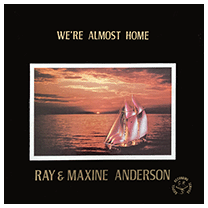 Reverend Ray Anderson & Maxine Anderson "We're Almost Home" (QCA/Gospel Recording Service, 196--?) (LP)
Reverend Ray Anderson & Maxine Anderson "We're Almost Home" (QCA/Gospel Recording Service, 196--?) (LP)
(Produced by Ray Anderson)
This album, cut with Anderson's wife Maxine, appears to have been very poorly recorded, though the murky sound quality may also be due to the griminess of the copy I picked up. It's also a bit of a shambolic mess, in musical terms. Everyone seems to be a little out of tune, with each musician whirling in slightly different circles than the others: Mr. Anderson is a little too laid-back and churchy-sounding, the rhythm section plods on, and the piano is so poorly mic-ed it has a jangling, echoing toy-piano feel, like one of those old "honky tonk piano" albums; meanwhile the backing singers oooh and aahhh all the livelong day without much relation to any given melody. There are some gems, though -- the plangent gal vocals on Maxine Anderson's "King Jesus" have a cool hillbilly authenticity, and equally delightful is Mr. Anderson's brazen theft of the melody to Hank Williams' "I'm So Lonesome I Could Die" (for his "You Must Take Time To Die," which I guess could be considered an answer song, of sorts. I wish this disc had better sound quality, though -- it would be a better record, obviously. For me, the resolute, primitive amateurism is definitely a plus.
Annabelle & Betty "He, The God Of Heaven" (Family Records, 197--?) (LP)
AnnaBelle Ferguson and Betty Shover were an aunt-and-niece gospel duo from Idaho, with each woman married to a Pentecostal minister in local Assembly Of God churches -- AnneBelle was married to Rev. Leamon U. Ferguson, a pastor in Rupert, Idaho, and Betty was wed to Rev. Don Shover of the Highway Assembly Of God Church in Fruitland, Idaho, which was actually quite a ways away. Their repertoire was filled with relatively twangy source material -- songs from Ira Stanphill, The Hinsons, Garland Craft's "That's Just Like Jesus," Porter Wagoner's "When I Sing For Him," and decidedly less-country stuff such as a popular Andre Crouch tune. Not sure who all the musicians were on this one, but other albums on this label were connected to the folks over at Ripcord Records, so it's probably a familiar local/regional crew.
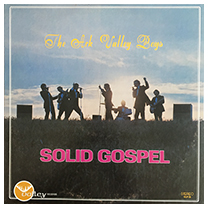 The Ark Valley Boys "Solid Gospel" (Valley Records, 198-) (LP)
The Ark Valley Boys "Solid Gospel" (Valley Records, 198-) (LP)
(Produced by Gary Duggen & Brian Kelsey)
This youthful Southern Gospel band from Haysville, Kansas took its name from a legendary western group called the Ark Valley Boys, which -- beginning in 1939 -- was the house band for radio station KFH, Wichita. I'm not sure if these guys have any direct connection to the original AV Boys, but there is certainly a lot of colorful history to the name. The original Ark Valley Boys were early stars of Kansas country music, and fostered the careers of numerous local musicians, including Fiddlin' Willie Boggs, Kay Stalker, pianist-arranger "Corky" Edminster (1916-2013) and others. The band fractured in the 1949 when Edminster and a half-dozen musicians left KFH, kicking off a legal battle between the station and the musicians' union when KFH hired Tex Ferguson to lead a new band with the same name... Edminster formed his own group, Corky's Corral Gang, which then played on rival radio station KANS; some bandmembers also followed Edminster out to Hollywood, where he worked with Smiley Burnette on various cowboy "oater" movies. In the 1950s, Willie Boggs went on to play in a version of the Ark Valley Boys which performed on KAKE-TV's country program, "Dusty's Jamboree," hosted by Dusty Herring, a real-life deputy sheriff in Wichita. From there, the trail gets a little hazy. There was a western swing group formed in Pueblo, Colorado in the 1940s and led by Clyde Casebier which was billed as the Arkansas Valley Boys, which has been (I believe) mistakenly identified as an offshoot of the Kansas band; also a guy named Bill Wimberly led an edition of the Ark Valley Boys in the 'Fifties, though I'm not sure how he fits into the overall story. At any rate, this 1980s(?) group may have simply borrowed the name of the popular old band for their own gospel vocals, or maybe someone's uncle once played with them; I dunno. As far as I know these two LPs -- one gospel, one secular -- were the only two cut by this group; neither on includes a release date. The lineup was: Rob Wilson (tenor), Ron Baggett (second tenor, emcee), Glenn Hanna (baritone), Dick Warren (bass), Dave Thomas (piano), Fred Townsend (drums) Curt Baggett (bass guitar), recording a session at the Benson Sound Studios, in Oklahoma City. Musically solid, with clear country roots, though on this album they lean pretty far into the sluggish, mopey vocal style popular in the Southern Gospel scene. The twangier, uptempo numbers are satisfying, but few.
![]() The Arkansans Quartet "Singing The Gospel In Song" (John's Recording Studio, 197--?) (LP)
The Arkansans Quartet "Singing The Gospel In Song" (John's Recording Studio, 197--?) (LP)
A robust set of barbershop-y southern gospel from a group that hailed from an undisclosed part of Arkansas (possibly around Arkadelphia...) The group included bass vocalist Charlie D. Nix, his wife Carol Nix, who plays piano and adds harmony, along with lead singer Paul D. Shuffield, Gary Beavers (tenor), Darrell Stone (baritone) and Tommy Neighbors on bass guitar. This was recorded at John's Recording Studio, a regional powerhouse that recorded both religious and secular sessions, and several tracks also include some fine, discreet steel guitar from an unidentified studio musician, likely one of Jerry Jaye's cohort... Overall this is a pretty low-key set, fairly unremarkable though I do enjoy the steel work... Still, there may be enough regular-folks imperfection for this album to be of above-average interest, but only slightly. Also worth noting is how they dwell on the low, low-end baritone vocals in a way that makes it feel a bit kitschy... which is not necessarily a bad thing!
Eddy Arnold "When It's Roundup Time In Heaven" (RCA Victor, 1954) (10" LP)
Eddy Arnold "The Chapel On The Hill" (RCA Victor, 1956) (LP)
Eddy Arnold "Praise Him, Praise Him: Fanny Crosby Hymns" (RCA Victor, 1958) (LP)
(Produced by Chet Atkins)
A tribute to songwriter Fanny Crosby, a 19th Century American Methodist best known for the abundant flow of hymns and religious songs she composed over several decades, such as "Blessed Assurance" and "Praise Him, Praise Him," both included here.
Eddy Arnold "Faithfully Yours" (RCA Victor, 1963) (LP)
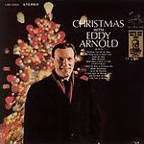 Eddy Arnold "Christmas With Eddy Arnold" (RCA Victor, 1962) (LP)
Eddy Arnold "Christmas With Eddy Arnold" (RCA Victor, 1962) (LP)
(Produced by Chet Atkins)
It's the crooniest Christmas ever... Look out there, Bing!!
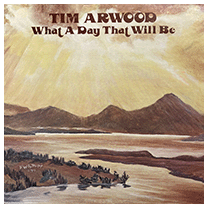 Tim Arwood "What A Day That Will Be" (Jot Records, 1978-?)
Tim Arwood "What A Day That Will Be" (Jot Records, 1978-?)
Not a lot of info about this contemporary Christian evangelical folk/country singer, other than what he provides in the liner notes. Mr. Arwood says he was saved in 1970, after several sinful years sowing wilds oats... and making up for it by pursuing an evangelical path. He recorded this album down in Southern California, at the Buck Owens Studios, supported by steel player Terry Christofferson, LA hotshot guitarist Don Lee, Jim Shaw (keyboards), Doyle Singer (bass), Jerry Wiggins on drums and a gal named Connie Bonar singing backup. The repertoire is a mix of classics like "His eye Is On The Sparrow" and Old Rugged Cross," along with more contemporary material from folks like Andre Crouch, Bill Gaither and, of course, a cover of Ronnie Hinson's "The Lighthouse." There's also at least one original, James E. Redden's "Still There Is Jesus," which gets a special note about its 1978 copyright, and helps date this album to(probably) that year. Not sure where Mr. Arwood was from -- I found Tim Arwoods in several different states, including one who went to high school in San Jose, CA, but also a couple of guys in the South. There was a 2016 show notice for a Tim Arwood who was singing as part of a holiday gospel program in Rose City, Texas, who was probably the same guy, and it's possible he may have been working in Branson, Missouri at the time. Anyway, some real twang talent backing him up here -- Don Lee fans in particular might wanna check this out.
![]() Mike Aspinwall "Mike Aspinwall (A Thumbnail Sketch)" (Aquarius Records, 19--?) (LP)
Mike Aspinwall "Mike Aspinwall (A Thumbnail Sketch)" (Aquarius Records, 19--?) (LP)
A real mystery disc, this ultra-private press record sports a plain white cardboard jacket, and no identifying information other than a misspelled city name ("Manhatten Beach") on the the inner label to let us know this was an LA-area artist. Mr. Aspinwall seems to have been a Christian folkie -- the LP's first side appears mostly secular, but Side Two is fully religious, name-checking The Lord, and culminating in the mini-cachetism of the last two songs: "Do You Believe In Him" and "I Do Believe." The album's "title" appears to have been an afterthought: nothing is printed o the jacket or the disc, but a handwritten note next to a thumbprint (presumably done by hand) gives the correct spelling of Mr. Aspinwall's name (it's presented as "Aspenwall" on the disc) and the "thumbnail" title as well. There are no songwriter credits, but I think these were mostly if not all original compositions. Looks to be late 1960s or early 'Seventies.
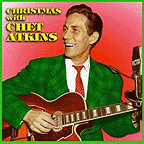 Chet Atkins "Christmas With Chet Atkins" (RCA Victor, 1961)
Chet Atkins "Christmas With Chet Atkins" (RCA Victor, 1961)
Nashville's superpicker of all superpickers gets homey with the holiday spirit... This'll hit the spot if you're up for a bit of twangy yuletide cheer. (For more Christmas music, check out my Hillbilly Holiday section.)
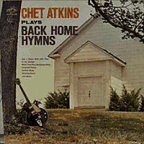 Chet Atkins "Back Home Hymns" (RCA, 1962)
Chet Atkins "Back Home Hymns" (RCA, 1962)
The ever-silky Atkins touch is applied to a dozen old-time hymns, some better known than others. Chet takes it slow, which is pretty nice on the more vigorous melodies, (like "Just A Closer Walk With Thee" and "Lonesome Valley"). On the churchier numbers, though, it can get a little leaden. A nice new take on this traditional material, with Chet's buttery electric guitar weaving a whole new experience of these fine old tunes.
Chet Atkins "East Tennessee Christmas" (CBS Records, 1983)
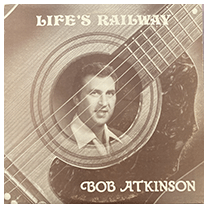 Bob Atkinson "Life's Railway" (QCA Recording Studio, 19--?) (LP)
Bob Atkinson "Life's Railway" (QCA Recording Studio, 19--?) (LP)
(Produced by Charles Novell & Ric Probst)
A remarkably flawed country gospel album... on many levels. Bob Atkinson was a family man from Butler, Pennsylvania, backed on this album by an A-list studio group drawn from the Cincinnati-based QCA studio's house band: co-producer Charles Novell sits in on piano, with Denny Rice (rhythm guitar), Chuck Rich (steel guitar), Tim Short (drums), and Mike Taulbee on bass. Things start out okay, with a robust pop-country arrangement on "Life's Railway," but soon go sideways with a series of drab, mushy, too-slick-sounding southern gospel ballads. What really lights this album up, though, are the lyrics of a song called "Old Buddha," which is just about the single most offensive, intolerant Christian country song I've ever heard. It's a real jaw-dropper. The premise is simple enough: if you get to Heaven, it won't be that Buddha guy sitting on the celestial throne -- nosiree, all his followers are 100% going straight to Hell. That's just the first verse. Mr. Atkinson goes on to lambaste several other religions, then moves on to various Christian denominations with which he also seems to have a beef -- Baptists, "charismatics," etc. -- then gives a little zinger at the end, taking a pot shot at the Moonies. The best part is his metric for who gets in and who doesn't: you can't get to Heaven if you don't love your fellow man. Wow. Talk about lacking self-awareness. As offensive as the song is textually, it also suffers melodically -- instead of being some jaunty little hate-hymn that you can't get out of your head, instead it's just another dreary, drippy Christian pop anthem, more country-sounding than the other tracks, sure, but not very engaging on a musical level. The liner notes tell us Mr. Atkinson used to play in some secular bands, but no solid details about where or when. Oh, well.
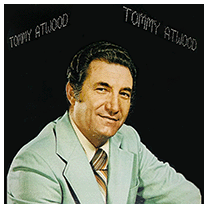 Tommy Atwood "Tommy Atwood" (Sonlight Records, 1977-?) (LP)
Tommy Atwood "Tommy Atwood" (Sonlight Records, 1977-?) (LP)
(Produced by Ronnie Drake & Kevin McManus)
Christian country with an all-star Nashville cast, courtesy of Hilltop Studios: Jim Baker on steel guitar, Jack Eubanks (lead guitar), D. J. Fontana (drums), Bill Humble (bass), Leo Jackson (rhythm guitar) and Bunky Keels on piano, with backing vocals by the Sound 70 chorus. Evangelist Tommy Atwood had real rural roots, hailing from Satsuma, Alabama, a northern suburb of Mobile. Although there are several standards on here ("I'm On My Way," "My God Is Real," "Just A Closer Walk With Thee") this album is notable for the wealth of original material, including five songs credited to Mr. Atwood, along with two others sharing his same publishing company, Beasley & Barker-BMI. The other two songs were composed by William Carter and Ed Chapman, whose relations (if any) to Tommy Atwood are unknown.
More Country Gospel -- Letter "B"


